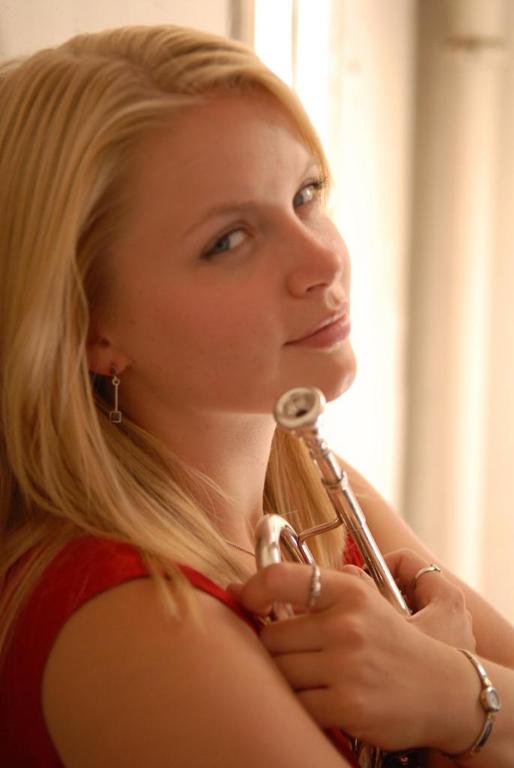Interview: Bria Skonberg on finding her foundation and nurturing the discovery of jazz across audiences


“I’m preparing right now for a jazz camp,” Bria Skonberg says, speaking over the phone from her home in New York.
Establishing the New York Hot Jazz Camp, which has sessions for both children and adults, has been a longterm dream for the Canadian trumpeter, singer, and songwriter who spent many memorable Springs of her own soaking up the sounds and energy at jazz festivals in the Fraser Valley.
Camp will commence in mid-April and in May, a few weeks after Skonberg is set to return from the JUNO Awards in Ottawa — for which she is packing for at the moment — and at which her self-titled album, Bria, would go on win for Vocal Jazz Album of the Year.
For Skonberg, the JUNO nomination itself was an honour — the cherry on top of a project that she poured her heart and soul into. Crowd-funded and then picked up by Sony Music Masterworks’ OKeh Records, Bria blends Skonberg’s New Orleans-flavoured soul with exotic arrangements and sultry vocals, and finds the musician at her most self-assured.

After years of exploring the colourful palettes of classical jazz and coming to understand her modern-tinged sensibilities, Skonberg has arrived at a place where her chops and influences combine to form a foundation at once cohesive, fresh, and truly reflective of her character. A big part of that, she says, was carving out a space for both her voice and her trumpet to co-exist.
“That’s just been a journey in itself, learning two instruments and finding a way to make them work together,” Skonberg says, citing Bria’s producer, Matt Pierson, as a guiding light. “This time, I especially picked songs that would create a mood — [picked] or [wrote] songs that would act as vehicles for both of those instruments to live.”
The album represents a coming of age for Skonberg — in fact, it’s been such a prolific time, creatively, that she’s already completed another new album due to be released soon — and a musical maturity that has been gleaned from her accumulated experiences.
Growing up in Chilliwack, she was first introduced to jazz by watching her older brother play in the school jazz band (a place she would, too, cut her teeth). “Musically, I guess I just liked the changing in the rhythms,” she says, of what first attracted her to jazz. “It sounded very natural to me, the idea of improvising and being more free with the music. And also, classic jazz has such great melodies and so I would listen to it and songs would get stuck in my head, as much as the pop music I was listening to at the same time.”
After graduating from Capilano University with a degree in Jazz Trumpet Performance, she worked with local big band legend Dal Richards. As a mentor, Richards taught her how to harness an audience.
“There [was] a lot of singing and dancing and pacing,” she recalls of Richards’ stage presence, “and, even in his 90s, Dal was always watching the audience to try to figure out the next best thing to do.”
When Skonberg moved to New York in 2010, she began further exploring her gifts as a songwriter and playing with different sounds. Jazz, of course, is rooted in experimentation and one of Skonberg’s best tendencies is the way she steps outside of genre boundaries. Her takes on Janis Joplin’s “Mercedes Benz,” Joni Mitchell’s “Big Yellow Taxi,” and, from her latest effort, Doris Day’s “Que Sera Sera (Whatever Will Be Will Be)” are original, smooth, and bright, bringing a fresh perspective to the song’s sonic narratives.

Photo: Wendy D
“That’s just the music that I like and I grew up listening to so many different styles before I was listening to jazz,” Skonberg explains.
“I think that started really happening when I started writing music, too, because, it was interesting to see what bubbled up. After going through some pretty intense jazz school, I went to write songs and the first things that wanted to come out were doo-wop hits and disco funk, like Jamiroquai, and so I just let it. Understanding that those were part of my sensibilities just gave me some freedom and confidence to play with some other genres.”
In doing this, Skonberg extends her reach to a wide range of audience — those who might not have attuned their ears to jazz otherwise. And, ultimately, she maintains, her goal is to reach people.
“The thing that I found about putting more of myself and my taste into the music is that more like-minded people have gravitated back and that’s kind of important — to me, at least. They understand where I’m going and they can see what I’m thinking and, if I start to pull in another direction, there’s trust.”
Festivals are great forms of discovery, as well, and something Skonberg is also fiercely passionate about — she even co-founded her own, the New York Hot Jazz Festival, in 2013. In this way, Skonberg’s life experiences and interests have harmoniously come full circle. And, to be able to nurture the discovery of jazz for others in the same way it was for her is a component of the culture that, she insists, she will always be a part of.
“It’s so essential,” Skonberg says. “Especially with the style of music. I mean, it’s the music of stories, it’s the music of legends, and it’s telling that, hand-to-hand, generation-to-generation. And I had people that passed it down to me and you just have to pay it forward.”
Coastal Jazz – Bria Skonberg
When: Saturday, May 27
Where: Frankie’s Jazz Club – 765 Beatty St., Vancouver
Tickets: At OpenTable; $20

